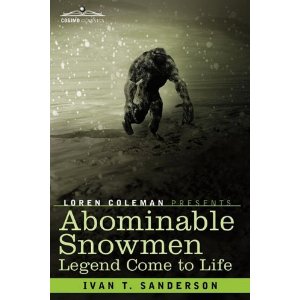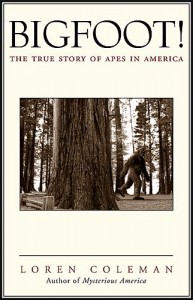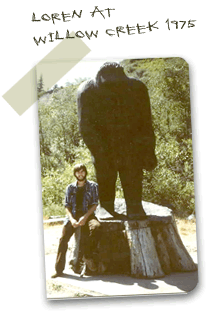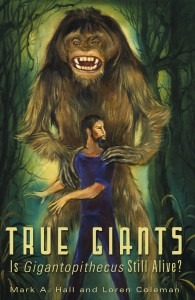
December 25, 2010
Micah A. Hanks at The Gralien Report writes:
For the average reader who is not well-versed in cryptozoology…True Giants may require a generous suspension of disbelief, since the nature of reports of giant human-like creatures–sometimes reaching an astounding 25 feet in height–is simply too much for one to accept very easily. This illustrates something unique about Coleman and Hall’s approach, however: the inherent representation here (articulated thusly many times throughout the body of the text), is that the notion of gigantic forms existing in the remotest portions of our world today, presumably the living descendants of a beast called Gigantopithecus, is indeed too much for most to grasp. The authors note in their book, as they each have no doubt done many times before, that in the event someone should claim to see a 12-15 foot tall “giant,” they will become an object of ridicule amongst their peers–or worse, at the hands of the volatile media. But primarily, the reason discussion of giants that would dwarf a typical Sasquatch is so tricky is because the generalized stereotype of “Bigfoot” in our culture has had a tendency to grand-stand over the years, literally overshadowing the truly strange and clandestine reports of larger beings that have surfaced on occasion.

If you are inexperienced in matters pertaining to cryptozoology and Bigfoot, you may be well advised to first read Ivan Sanderson’s Abominable Snowmen: Legend Come to Life and Loren Coleman’s Bigfoot!: The True Story of Apes in America beforehand.

There are, however, a number of fascinating assertions made in True Giants that, even for a well-seasoned scholar in this field, are both educational and enlivening. For instance, my earliest published article on the nature of what the late Mr. Sanderson would amiably call “Sasquatchery” dealt with whether the creatures may have a language (see “Voices in the Dark: Do Sasquatches Have a Language?” from Fate Magazine, October 2004). Coleman and Hall also discuss the fact that these True Giants may, at times, have learned to speak human languages, in addition to having a native tongue of their own. Additionally, reports the authors deal with often illustrate instances where the creatures are seen wearing simple clothing, or using basic tools (a reference to their potential “technological pursuits such as smithing” is even made). Stereotypical representations of giants throughout history as somewhat less intelligent than humans, as well as their propensity for dwelling in caves and remote regions of the world, all seem to represent consistencies between various folk-beliefs about beings of large stature, as well as realities we may apply to the existence of an actual species existing today.
Sad though it is, altogether this book will likely go unnoticed by the mainstream intelligentsia for now; a few who do stumble onto it will dismiss or ridicule what they find within its pages, and forget about the predictions Coleman and Hall made therein. But one day, should the living descendants of an ancient creature–an ape of terrific stature who walked upright like a man–actually be discovered, there will be no question whatsoever as to who had wisely separated what so many have dismissed as folk traditions, and applied them to the scientific study of strange beings in our midst. In a sense, Coleman and Hall might be considered futurists, just as well as hominologists, folklorists, or a host of other applicable titles; but those who read True Giants while armed with a healthy knowledge of history from the field of cryptozoology will agree on a simpler title: they’re just right. The world may need several years catch up with this detailed examination, depicting creatures so large they have literally managed to hide themselves not only from humanity, but from belief systems that have shunned the very notion of their existence for centuries; in spite of the evidence being heaped onto the proverbial table already in the heartiest of servings.

Coleman and Hall set forth with academic eloquence, and void of flamboyance and sensationalism so characterized within this field, have managed to present a highly unique study, providing a window through which we might observe life on this planet that, despite their their tremendous size, we somehow have managed to overlook. As for me, it will remain a subject I’ll enjoy ruminating over in the midst of aromatic tobacco, strong drink, and a certain beautiful lady for many holiday seasons to come.
Did you know more sales at Amazon.com are made during the two days of Christmas and the day after than on any other two-day-period all year long. Visit Amazon along with hundreds of your cryptofriends, and use your Amazon gift credits to pick up one copy of True Giants today by clicking here and on the other book titles too, posted above.

About Loren Coleman
Loren Coleman is one of the world’s leading cryptozoologists, some say “the” leading living cryptozoologist. Certainly, he is acknowledged as the current living American researcher and writer who has most popularized cryptozoology in the late 20th and early 21st centuries.
Starting his fieldwork and investigations in 1960, after traveling and trekking extensively in pursuit of cryptozoological mysteries, Coleman began writing to share his experiences in 1969. An honorary member of Ivan T. Sanderson’s Society for the Investigation of the Unexplained in the 1970s, Coleman has been bestowed with similar honorary memberships of the North Idaho College Cryptozoology Club in 1983, and in subsequent years, that of the British Columbia Scientific Cryptozoology Club, CryptoSafari International, and other international organizations. He was also a Life Member and Benefactor of the International Society of Cryptozoology (now-defunct).
Loren Coleman’s daily blog, as a member of the Cryptomundo Team, served as an ongoing avenue of communication for the ever-growing body of cryptozoo news from 2005 through 2013. He returned as an infrequent contributor beginning Halloween week of 2015.
Coleman is the founder in 2003, and current director of the International Cryptozoology Museum in Portland, Maine.
Filed under Books, Breaking News, CryptoZoo News, Guest Blog, Reviews